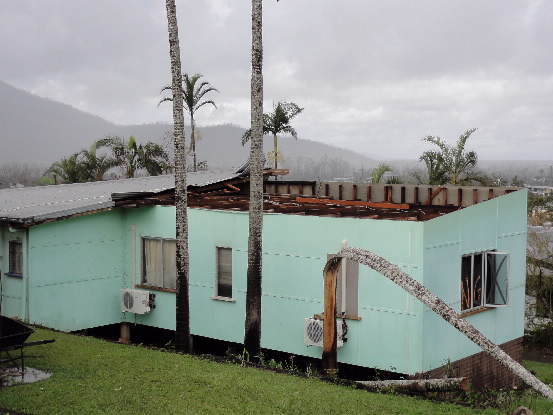Media Releases
A sense of place key to disaster recovery
A sense of place key to disaster recovery
First published 21 December 2012

Photo credit: Matthew Mason
Caption: A Tully home after Tropical Cyclone Yasi.
New research lead by a James Cook University researcher shows people with a strong connection to their community have better success in recovering from extreme weather events.
In addition, residents who remained living in a community after a disaster were those who were more likely to be resilient to the disaster’s impacts.
Dr Helen Boon, Senior Lecturer in JCU’s School of Education, was the lead author of Recovery from Disaster: Resilience, Adaptability and Perceptions of Climate Change funded by the National Climate Change Adaptation Research Facility (NCCARF).
Dr Boon said the study showed having social relationships in the community rated highly, as did being financially comfortable.
“The results showed that resilience is both an individual trait and a process,” she said. “The strongest direct predictor of resilience was adaptability and a sense of place.”
“Successful recovery from disaster was influenced by financial capacity, family and neighbour support and how much people knew about climate change and how well they trusted public communication sources.”
Dr Boon said the project analysed both individual and community resilience in Beechworth and Bendigo in Victoria and Ingham and Innisfail in Queensland; sites recovering from bushfire, drought, flood and cyclone.
The study assessed the degree of community resilience and constructed a model to help implement appropriate and equitable emergency management policies and mitigation strategies for climate change events.
Dr Boon said they wanted to identify beliefs, behaviours and policies that had supported community resilience to a disaster event, in both private and public sector groups.
“We needed to examine the common experiences for four types of disaster and the possible impact of their intensity, duration and frequency, as well as how well communities cope with the unexpected.”
Dr Boon said 186 participants from the four communities were interviewed and surveys were completed by more than 1000 residents to generalise the interview responses.
For a profile on Dr Boon, visit visit http://www-public.jcu.edu.au/education/staff/JCUPRD_032990 Download the NCCARF final report: http://www.nccarf.edu.au/publications/recovery-disaster-resilience-adaptability-climate-change
This work was carried out with financial support from the Australian Government Department of Climate Change and Energy Efficiency) and the National Climate Change Adaptation Research Facility.
For interviews, Dr Boon can be contacted on (07) 4781 6030.
JCU Media contact: Caroline Kaurila (07) 4781 4586 or 0437 028 175